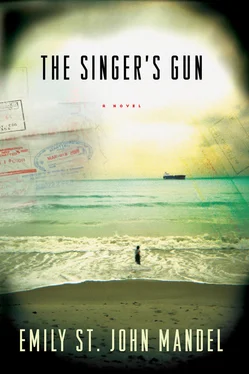“Ischia!” a crew member shouted, and Broden stepped out onto the dock. She traveled by taxi to the town of Sant’Angelo, where the driver let her off at the top of a long hill and told her he could go no farther.
She went first to the hotel where Sophie had said they had stayed. It was a warm day; the doors of the restaurant had been thrown open, and one or two waiters moved about in the cool shadows of the interior. An orange cat was sleeping in a beam of sunlight just inside the threshold.
Broden knelt awkwardly on the cobblestones and touched the cat’s soft fur. The cat started awake, but only one eye opened. He purred when Broden stroked his head.
“He likes you,” a man said in Italian. He stood a few feet inside the restaurant. An immaculate man in his fifties, well dressed. Blue sea glinted through the windows behind him.
“I like him,” Broden said. “Who does he belong to?”
“He’s the hotel cat,” Gennaro said. “He keeps the mice away.”
“So he doesn’t belong to anyone in particular?” It had been some years since she’d had occasion to speak Italian, and the language felt awkward to her. She was sure she was mispronouncing important words. The cat turned over on his back so Broden could stroke his milk-white stomach.
“Well, he’s Anton’s cat, I suppose. But we’ve all adopted him.”
Broden was still for a moment, her hand on the cat. She stood up slowly to look at him.
“Anton’s cat,” she said carefully. “Are you saying. . is Anton here?”
“He lives here,” Gennaro said, “but he works in another town during the day.”
Broden smiled. “He lives here?”
“You know him?”
“I’m a friend of the family,” she said. “His mother said he might be here and I was hoping to see him. Do you know what time he’ll be back?”
Gennaro glanced at his watch. “He usually eats dinner here around seven,” he said, “but it’s still only the afternoon. Is he expecting you?”
“It’s a surprise,” Broden said. “Is there somewhere I might wait for him?”
“There’s a piazza just around the corner.”
“When you see Anton, will you tell him I’m waiting for him?”
“Of course.”
She walked away down the hill and the piazza opened up before her. It was only April but summer had started early. The air was hot and tourists already wandered the cobblestones, buying newspapers at the newsstand and linen dresses at the clothing boutique by the still-closed seafood restaurant, and two out of three cafés had outdoor tables and umbrellas set up in the sunlight. Broden chose a table with a pleasant view of the harbor, ordered a cup of coffee and a sandwich and settled down to wait.
An hour passed, and then two. The boats moved in and out of the harbor. She paid and went across the square to another café for a change of view. She drank more coffee, ordered another sandwich, bought a paper and read it cover to cover, then sat for a long time watching the boys play on the beach. She had brought a novel with her — a thick paperback about spies that she’d picked up in an airport — but she didn’t care for the opening and put it back in her bag.
There’s something unnatural about being alone in paradise, and the loneliness was strange and unexpected. She watched the stream of tourists and realized that she was surrounded by couples and children. She missed her husband and daughter. She was thinking of Anton’s parents, remembering his mother sitting slumped on the loading dock, staring out at the water with no light in her eyes. There was no doubt in Broden’s mind that they believed Anton to be dead, and she found herself trying to imagine what unfathomable set of circumstances might compel her to turn the police away if she thought her child had been murdered. In her mind’s eye she saw Tova lying on the ground like a broken doll, and the thought was so blindingly horrific that she had to close her eyes for a moment and force herself to think of nothing.
In her wallet she was carrying an identification card. Anton Waker, Water Inc., 420 Lexington Ave. Broden looked at the photograph in the warm end-of-day light. Anton Waker stared into the camera, just another office worker, smiling slightly. Nothing in his calm gaze suggested that he’d sold a Social Security number and fake passport to his secretary, or that the diploma on the wall above his desk was a fake, or that he came from the kind of family that sold stolen goods and imported girls from Europe in shipping containers.
Broden had been waiting for nearly four hours. The sun was dropping low in the sky but the heat was undiminished and tourists milled about on the beach. She closed her eyes and leaned back in her chair. Listening to the seagulls, the voices, the waves and the movement of boats in the harbor.
“You know,” Anton said, “I could never figure out where they hide the magnetic strip.”
Broden opened her eyes. The man sitting across the table in a t-shirt and jeans bore little resemblance to the pale young office worker on the surface of the identity card.
“It’s the black border around the picture,” Broden said. “That’s what the scanner reads in the lobby.”
“Who are you?”
“I’m Alexandra Broden.” She reached into her pocket for her badge and set it down on the table between them. “I work with the State Department, Diplomatic Security Service. We’re the division that investigates passport fraud.”
“Well, I don’t know anything about passport fraud.”
“I’m afraid it’s a little late for that,” Broden said. “I have you on tape.”
“I doubt that,” Anton said, with considerably more confidence than he felt at that moment. He had stopped by the hotel on the way to the beach and Gennaro had told him that someone wanted to see him, and now he wished there was some way of silently warning Elena not to come to him. She had been back on Ischia for three weeks, and she spent her afternoons reading on the warm sand under an enormous sun hat. He found himself looking for her among the tourists.
“Your first sale was to a waitress,” Broden said. “She worked at an Irish bar near Grand Central Station. She wanted to go to flight school.”
Anton was looking down the beach but he couldn’t see Elena. In a hazy recess of memory she reclined on the floor of his office and reached casually into her handbag. What was it like when you were growing up? His heart was beating very fast. “That’s a nice story,” he said, “but I’m afraid I don’t know what you’re talking about.”
“Who else? Federico. He was from Bolivia, and he scared you a little. He made a joke about shooting you, so the waitress called Aria from behind the bar and she came and took you away from there. Shall I go on?”
Anton was silent. He had spotted Elena among the tourists. She was sitting on the sand near the water’s edge under the shade of her sun hat, looking out toward Capri.
“There was Catina,” Broden said. “Catina from Lisbon. She was reading a magazine when you came into the Russian Café.”
“Do you still talk to Elena?” Anton asked flatly.
“No,” she said, “Elena’s served her purpose for me. But if you’re still talking to Elena, you should understand the position she was in. She was facing deportation if she didn’t cooperate.”
“Back to the arctic,” Anton said. He tried to smile, but it was a painful wince. “I probably would’ve done the same thing.”
“But I’m not here to talk about Elena,” Broden said, “although I’d be interested to know what became of her. I’d prefer to talk to you about a shipping container.”
“I’m afraid I don’t know very much about shipping containers.”
“Then let me describe one to you.” Broden’s voice was calm. “A blue shipping container of uncertain origin comes into the dock at Red Hook in Brooklyn. It’s unlike most shipping containers, in that it has a makeshift air pipe, and this air pipe leads to a secret room. The room’s seven feet eight inches by eight feet, and it holds fifteen girls.”
Читать дальше





![Ричард Деминг - Whistle Past the Graveyard [= Give the Girl a Gun]](/books/412176/richard-deming-whistle-past-the-graveyard-give-t-thumb.webp)






